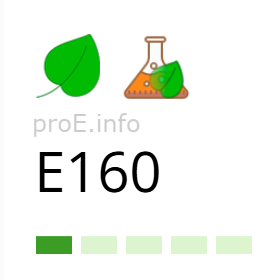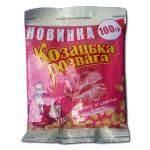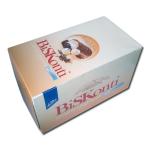
Other names for the additive (synonyms)
General Information
Food additive E160 is a natural colorant belonging to the carotenoid group. Depending on the raw material used and the method of production, additive E160 has several subtypes:
- Carotene - E160a;
- Annatto extracts - E160b;
- Paprika oil resins - E160c;
- Lycopene - E160d;
- Carotinaldehyde - E160e;
- Ethyl ester of carotenoic acid - E160f.
The E160 group of colorants has both natural and synthetic origins. The main source for producing the additive is typically plant-based raw material. Synthetic analogs of this colorant also exist.
Food additive E160 is a hydrocarbon, a yellow-orange pigment that colors products accordingly.
Carotenoids can be obtained from various plants, mostly those with orange and red colors, such as carrots, pumpkins, rose hips, and various fruits. The main method for obtaining E160 is chemical synthesis and the extraction of coloring substances from products.
Additive E160 is insoluble in water but dissolves well in organic solvents and fats. The colorant is stable to light and acid.
Main characteristics of food additive E160:
- Color – bright orange;
- Odor – odorless;
- Consistency – powder.
Effects on the Body
Benefits of Additive E160
Carotenoids are essential substances for the body, promoting its development due to the presence of vitamin A in their composition. Since the body does not produce them naturally, a source of intake is required. The positive properties of carotenoids include:
- They are antioxidants;
- They slow down the aging of cells;
- They help prevent cancer;
- They combat the formation of free radicals;
- They help increase the number of cells that detoxify the body;
- They strengthen the walls of blood vessels;
- They protect cells from viruses;
- They ensure normal growth of the body;
- They help improve vision;
- They are structural elements of cell membranes.
Risks of Additive E160
The harm is caused by a deficiency of carotenoids in the body, which can slow down growth, lead to night blindness, and lower immunity.
Overdose of carotenoids will also not have a positive effect – it can cause allergic reactions such as rashes and itching, and skin color changes (turning orange due to the accumulation of the substance in fat tissue). Excess carotene in the blood causes carotinemia, which is not dangerous.
The daily intake of carotene is 1.8 – 5 mg, and a slight excess will not lead to negative consequences.
According to research, a sharp increase in carotene levels in the body may lead to prostate and lung cancer in smokers and workers exposed to asbestos and certain other hazardous substances. The Journal of the National Cancer Institute published data research studies confirming that regular consumption of excessive doses of carotene increases the risk of cancer development by about ¼.
Additionally, regular consumption of large amounts of carotene can cause general poisoning of the body (this applies only to chemically synthesized additive E160).
Uses
Food additive E160 is used to color food products in a yellow-orange color:
- spreads, margarine, and oils;
- mayonnaises, sauces;
- cheeses, processed cheese products;
- sweets;
- baked goods;
- instant soups;
- concentrated drinks.
The colorant E160 is also used in the cosmetics industry – it is added to creams, oils, and skin toners.
Legal Status
All additives in the E160 group are approved for use worldwide. They are used both for coloring and for vitamin fortification of products.



